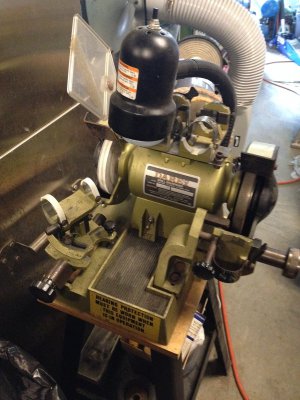The Darex, Sellers, Oliver, Black Diamond, even Giddings and Lewis are just great IF you have lots of larger drills to grind along with plenty of money and shop space. I don't have the shop space and I would not use one enough to justify the cost of one.
There is a definite understanding and learning curve involved with all drill grinding methods, from the cheapest to the fanciest. I started with one of the Craftsman swing type grinding jigs that is typically used on the side of a bench grinder wheel. After spending time figuring out how it really works and how to adjust it for the desired results on various size and geometry drills, it works just fine, great results. After that I learned to grind drills by hand and by eye at a bench grinder. It is not really difficult, but there is an art to doing it correctly which takes practice. Beyond that, for both of the methods I have mentioned so far, most people just aim for sharp, but also needed is accurate sized holes, both cutting edges doing equal work, and proper relief for correct feeds and good support for the cutting edges. For both these methods a drill point gauge is needed to check for equal angles and lengths on the cutting edges and equal relief -- on every drill sharpened. In the last couple years I have come into many hundreds of nice vintage USA drill bits from .006" to about 1 1/2" diameter, at nearly free prices. After cleaning up the crud and rust and the buggered shanks, most needed a fresh grind. So I bought a Drill Doctor 750X along with an extra coarser wheel for larger drills. Again, there is a learning curve, but that machine works very well when used properly. I have been using it on drills from 3/32" to 3/4" with excellent results. After getting the technique down, drills can be ground very nicely without checking each one with a drill point gauge, which saves lots of time and squinting. With the 750X is is easy to change point angle and relief angle, and nice split points can be done as well with a bit of practice. All of the methods in this paragraph take considerable time and practice to do properly.
ALL drill grinding methods, jigs, and machines have a learning curve which requires study, practice, careful observation of results, and an good understanding of the process and of what makes a drill work well. Money will not buy instant success, and large and expensive automatic machines are for large shops doing lots of production drilling. Home shop guys like us need to use our eyes and brains instead of trying to purchase results.
No drill grinder or method works by itself...



